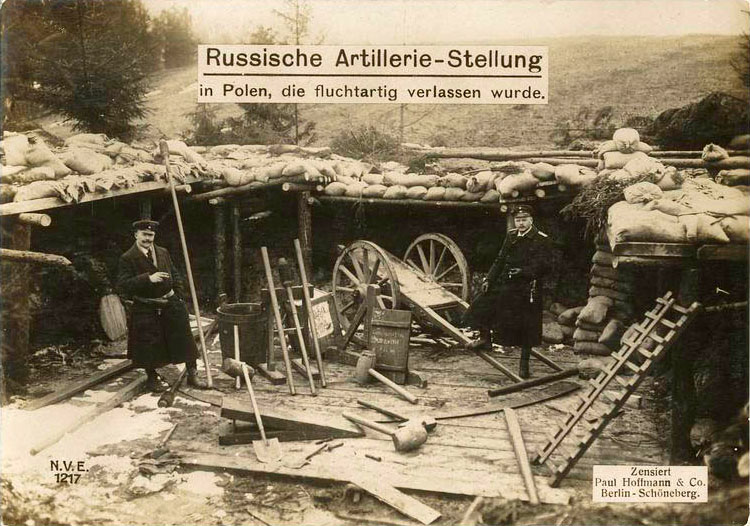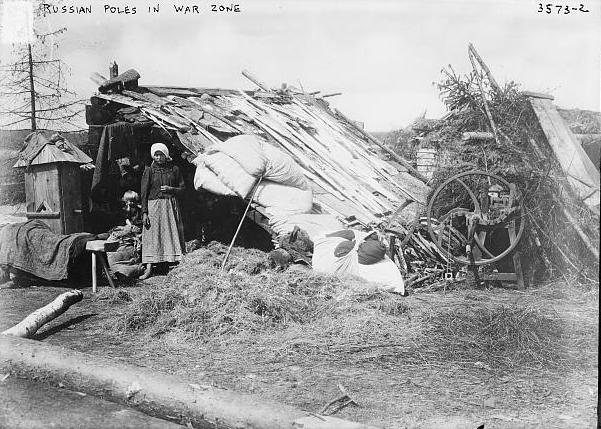 |
| Russian World War One poster, Russia bringing peace to Europe |
At
the beginning of World War One, both the Russians, and the Austrian and German
allies had plans for a reunited Poland under either Russian or Austrian
rule. The Austrian/German alliance envisioned a
new Poland uniting Austrian Galicia with Russian Poland. They planned to bring in a
member of the Austrian royal family as king of Poland. Both the Russians and
the Germans looked at a new Polish nation as a possible military zone in future wars thus protecting their respective homelands. The
Austrian/Germans appealed to the Poles under the Tsar's rule to fight for
freedom, and
independence from Russian rule. They hoped to expand Poland to the east. The Russian appeal to the Poles, issued
by Grand
Duke Nicholas on August 15, 1914, mentions 150 years of German rule in
Poland.
He stated that Poland's soul is not dead and hoped that the German and
Austrian
controlled sections of Poland could be joined to Russian Poland
and aligned with Russia under the rule of Tsar.
In
August 1914, the Russians invaded Austrian Galicia and German ruled
Poland. They were successful in
Galicia and controlled it for 2 years, but suffered terrible defeats by the Germans in northern Poland, losing The Battle of
Tannenberg and the Masurian Lakes.
Their path of the invasion crossed northern Poland and affected the people of Szczuczyn,
where many members of my husband’s family lived.
Although I do not have any stories from his family members, I do have
the memoir of Fay Jozefson Bernstein, who like my great aunt Katherine who lived in Galicia, lived in a battle
zone. Fay's memoir, written by David Bernstein, is published on the Szczuczyn
site. To read Fay's memoir, click on this link: www.szczuczyn.com/jozefson.htm
Fay
Jozefson Bernstein was born Frejda Jozefson in Szczuczyn in January 1905. Her father, Schmuel Jozefson, an
ordained rabbi died when she was six months old, leaving his wife, Hinda, and
five daughters. In order to
support her family, Hinda opened a grocery store, which served the neighborhood
as well as the Polish farmers who came to town on market days. Fay’s mother believed in education, she
was educated and she made sure that her daughters had educations. Although she was poor, she was
charitable; Fay remembers leaving packages of food on the doorsteps of poor
members of the Jewish community. In Szczuczyn there was a Yeshiva, a religious
school which trained rabbis.
Families in town took in students for meals, and Hinda took her turn
providing food for the students, often going without food herself.
 |
| Szczuczyn is located at the lower right quarter of the map. The Russian Army is blue, the German is red. |
Szczcuzyn
was less than a mile from the Polish-German border, in the area of Poland ruled
by Russia. In August 1914, the
Russians invaded Germany, and soldiers marched through the town. Since the Russians lost the Battle of
Tannenberg, there was fighting in the Szczuczyn area as they retreated. Fay tells about the first incident that
affected her family in Szczuczyn.
The German and Russian armies were shelling each other, the people of
the neighborhood were running, but didn’t know where to go. The neighbors told them to leave
everything behind and run. They
followed the crowd and came to a building with a basement and a metal
roof. The Jozefons hid in the basement
for almost two weeks. It was
crowded with people, women, children and crying babies. There was no water, and only bread and
raw potatoes to eat. When the
shooting stopped, they left and returned to their home. Their home was full of
bullet holes, and many possessions were gone. The Germans were gone, but they
weren’t gone for long.
Several
months later, in December 1914, the Germans returned. Jews were warned to leave immediately since the Germans believed that Jews were Russian spies, and would kill them. Fay could see people running, but she
had no idea where they were going.
The husband of Fay’s mother’s friend had a horse and wagon,
and she begged them to take Fay. They agreed to take her and Fay climbed in and hid under
blankets with the rest of their family. She didn’t realize until later that her
mother and sister were not in the wagon.
They traveled for a while and came to a house with a windmill near a forest. The owner of the farm hid the family,
as well as many other people. He
had an orchard, and provided the people with fruit to eat. Again they were crowded together in
darkness. They could make no
noise, since they could knew the soldiers outside would hear them and would
shoot and kill them.
Three
weeks later, the shooting stopped. After a few days of quiet, Fay begged the
man with the wagon to take her back to Szczuczyn so she could find her mother
and sister and finally he agreed. They rode into town and Fay got out of
the wagon, looked into her house and found it was riddled with bullets,
the windows broken and the house empty. Her mother and sister were gone. As she ran back to the wagon, soldiers appeared
and started to shoot at them. The
man beat his horse as they galloped away, shouted at Fay, saying that he was
risking his life trying to help her.
They returned to the farm and went into hiding again.
After three more weeks, her mother and sister were
found in a nearby village. The
soldiers had retreated and the Jozefson family returned to Szczuczyn. Their house and store had been looted and was empty. Hinda reopened the
grocery store, and was hopeful that things would improve. Although the border
was calm, the Jewish people of Szczuczyn were still afraid. They kept their homes completely dark
at night, and slept in their clothes, just in case.




No comments:
Post a Comment